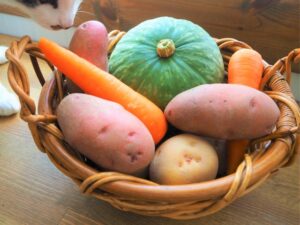Can I Give Vegetables and Fruits to Cats?

Have you ever caught your pet cat nibbling on a cucumber while you were not paying attention?
Cats sometimes eat vegetables and fruits like cucumbers and melons. However, cat owners may worry about whether it's okay for their pet cats to consume such items.
In conclusion, there are vegetables and fruits that are safe for cats to eat, and there are those that should be avoided.
Here, we will discuss what vegetables and fruits are suitable for cats, what should not be given, and points to consider when offering them.
Table of Contents
1. Is it Okay to Give Vegetables and Fruits to Cats?
2. What Cats Can and Cannot Eat
∟ 2-1. Vegetables that are Okay
∟ 2-2. Fruits that are Okay
∟ 2-3. Vegetables to Avoid
∟ 2-4. Fruits to Avoid
3. Things to Consider When Giving Vegetables and Fruits
∟ 3-1. Give in Small Quantities
∟ 3-2. Process the Food
∟ 3-3. Offer as Snacks or Toppings
∟ 3-4. Avoid Seasoning
∟ 3-5. Do not Give to Cats Undergoing Treatment
4. What to Do If Your Cat Accidentally Eats Something
5. Avoid Direct Contact with Cat's Eyes
Conclusion
1. Is it Okay to Give Vegetables and Fruits to Cats?

Cats are naturally carnivorous, so they don't need to consume as many vegetables as humans do. However, vegetables and fruits are rich in vitamins and dietary fiber, contributing to the prevention of skin diseases and constipation in cats.
Considering the supplementation of nutritional needs for carnivorous animals, giving vegetables and fruits to cats is not a problem. However, it's essential to be cautious as some vegetables and fruits may not be suitable for them.
2. What Cats Can and Cannot Eat

Do not give vegetables or fruits to cats just because they seem interested or curious about them. Some vegetables and fruits are safe to give, while others are not recommended.
2-1. Vegetables that are Okay
Vegetables with high water content, low calorie content, and low levels of sodium and potassium that won't burden the cat's digestive system are suitable. Some examples include:
- Cucumber
- Lettuce
- Cabbage
- Watercress
- Komatsuna (Japanese mustard spinach)
- Carrot
- Pumpkin
- Sweet Potato
These are representative vegetables that can be given to cats, but there are many others as well.
2-2. Fruits that are Okay
Fruits containing nutrients such as vitamin C, dietary fiber, calcium, and phosphorus, which cats may lack, can be given based on their preferences. However, it's important not to overdo it.
Some fruits that can be given include:
- Apple
- Pear
- Banana
- Watermelon
- Melon
- Peach
In addition, small amounts of citrus fruits like mandarins and strawberries can be given.
2-3. Vegetables to Avoid
Some vegetables, although delicious and nutritious for humans, can be dangerous for cats and may cause poisoning. Under no circumstances should the following vegetables be given:
- Green Onion
- Onion
- Garlic
- Leek
- Shallot
- Chives
- Asparagus
- Tomato
- Raw Potato
These vegetables contain substances that are toxic to cats.
2-4. Fruits to Avoid
Just like vegetables, some fruits can be harmful to cats. Avoid giving the following fruits:
- Grapes
- Raisins
- Cherry
- Persimmon
- Peach Pit
- Plum Pit
- Apricot Pit
- Avocado
These fruits may contain substances that are toxic or have potential choking hazards.
3. Things to Consider When Giving Vegetables and Fruits
When giving vegetables and fruits to cats, it's important to consider the following points:
3-1. Give in Small Quantities
Even if a vegetable or fruit is safe for cats, it's essential to give it in moderation. Too much of anything can lead to digestive issues.
3-2. Process the Food
Remove seeds, pits, and cores from fruits, and cook or steam vegetables to make them easier for cats to digest.
3-3. Offer as Snacks or Toppings
Instead of replacing your cat's regular food, offer vegetables and fruits as occasional treats or meal toppers.
3-4. Avoid Seasoning
Do not add seasoning, salt, sugar, or any other additives to the vegetables or fruits. Cats should consume them in their natural state.
3-5. Do not Give to Cats Undergoing Treatment
If your cat is undergoing medical treatment, consult with your veterinarian before introducing new foods to their diet.
4. What to Do If Your Cat Accidentally Eats Something
If your cat accidentally eats something toxic, contact your veterinarian immediately. Do not attempt to treat your cat at home without professional guidance.
5. Avoid Direct Contact with Cat's Eyes

When handling vegetables and fruits, be cautious not to touch your cat's eyes afterward. Some substances on the surface of these foods may cause irritation.
Conclusion
While some vegetables and fruits are safe and even beneficial for cats, it's crucial to be selective and considerate. Always monitor your cat's reaction and consult with your veterinarian if you have any concerns or questions about their diet.


